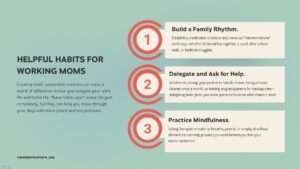What it Means to Be a Working Mother
You love your kids and your career. So why does it feel like you’re failing at both?
Welcome to the complicated reality of being a working mother, where ambition and guilt often go hand in hand. Between daycare drop-offs, deadline stress, sick days, and societal pressure to “do it all,” many moms find themselves overwhelmed and under-supported.
Working mom guilt is more than just a passing feeling. It’s a cultural phenomenon that affects mental health, identity, and overall well-being. In this blog post, we’ll explore what is the definition of working mom guilt, examine what is the biggest problem reported by working mothers, and share research-backed tools to help you manage burnout, embrace your ambition, and release the guilt that’s holding you back.
What Is Working Mom Guilt?
So, what is the definition of working mom guilt? At its core, working mom guilt is the emotional tug-of-war many mothers experience when trying to balance their careers and family responsibilities. It’s the guilt that surfaces when you drop your baby off at daycare and head to work, the heavy heart when you miss a school event because of a deadline, or the shame spiral after realizing you feel more fulfilled by a work project than a day spent at home.
What Causes Working Mom Guilt?
This feeling is deeply rooted in both internal expectations and external cultural narratives. Internally, many mothers feel guilty for not being physically present for every moment of their child’s life, even when they know their work is providing for their family.
Externally, society still glorifies the image of the ever-present, stay-at-home mom while often downplaying the realities of a working mother’s life. From social media to unsolicited advice from others, working mothers are constantly bombarded with messages suggesting that choosing a career means sacrificing their children’s well-being.
Unlike general mom guilt, which can show up around any parenting decision, working mom guilt is specifically tied to work-life balance and the pressure to “do it all” perfectly. It’s amplified by logistical challenges like limited access to paid maternity leave, inflexible work schedules, and inadequate childcare support. For some, this guilt evolves into more serious emotional challenges like working mom guilt depression, where the constant push and pull of work and parenting leads to anxiety, burnout, or even depressive symptoms.
And let’s not forget daycare guilt. That all-too-common pang of doubt and sadness many moms feel when leaving their child with someone else so they can go to work. Despite evidence that high-quality childcare supports healthy development, the guilt lingers, often worsened by well-meaning but judgmental comments or a lack of communal support (Source).
Ultimately, working mom guilt is not just a personal issue, it’s a cultural one. And understanding it is the first step toward releasing it.
The Emotional and Physical Toll for Working Parents: Burnout and Depression
Working mom guilt isn’t just an emotional inconvenience—it can take a serious toll on both your mental and physical health. When moms constantly juggle the demands of work life and home life, often with little rest or support, it can lead to working mom burnout. Add in the pressure to be present for every milestone while also succeeding professionally, and it’s no wonder so many mothers feel like they’re drowning.
So, what are the symptoms of burnout in working moms? Burnout can manifest in many ways: chronic fatigue that sleep doesn’t fix, irritability or emotional outbursts, brain fog, lack of motivation, physical aches and pains, and feeling disconnected from your work or your family. Many moms also report an overwhelming sense of failure—even when they’re doing their best on all fronts.
This exhaustion often leads to working mom guilt depression, where guilt becomes more than just a fleeting emotion. When guilt and stress linger for too long, they can impact a mother’s self-worth, contribute to anxiety, and spiral into clinical depression. And because our culture normalizes “pushing through” without acknowledging the emotional load mothers carry, many women suffer in silence.
Part of the problem lies in social expectations. Mothers are often told that they should cherish every moment at home while also climbing the ladder at work, all without showing signs of struggle. And yet, they’re frequently given inadequate support. The United States is one of the few high-income countries that does not mandate paid maternity leave, leaving many women to return to work before they’ve had time to recover physically or emotionally. Without this critical time to rest and bond with their baby, stress levels skyrocket.
What moms really need isn’t perfection—it’s support. That means more than a pat on the back or a self-care meme. It means structural change, access to flexible work options, and the freedom to prioritize quality time with their children without sacrificing career growth. It means reminding working mothers that burnout is not a personal failure—it’s a red flag that the system needs to change.
What the Research Says
If you’re a working mother who feels constantly torn between your job and your kids—you’re not imagining it. You’re also not alone.
According to the Pew Research Center, more than 70% of mothers with children under 18 are part of the workforce. And yet, a large number of these women report feeling persistent guilt about how they divide their time. In fact, working mom guilt statistics show that 57% of working moms worry that they don’t spend enough time with their children, compared to only 23% of working dads who share the same concern. That’s a significant gap and it speaks to the disproportionate pressure placed on mothers to “do it all.”
This emotional load often shows up in subtle but painful ways. For example, a mother might skip lunch to leave work early and make it to her child’s soccer game, only to sit on the sidelines checking work emails, feeling guilty for not being fully present in either role. Or she might stay late at the office and miss bedtime, wondering if her husband resents picking up the slack. These aren’t isolated incidents. They’re the daily challenges working mothers face.
And while many moms worry they’re failing their kids, research paints a different picture. A study from the University of Maryland found that the actual amount of time parents spend with their children has far less impact on child outcomes than the quality of that time. In other words, being present, engaged, and emotionally available—even for shorter periods—matters more than being physically present 24/7.
Still, that doesn’t erase the guilt. Workplace culture plays a big role in this, especially in environments where long hours are glorified and flexibility is limited. Without proper support, like paid maternity leave, mental health resources, or the understanding of managers and colleagues, moms are left feeling like they have to choose between their kids and their careers.
That’s where community becomes critical. Having a support network, whether it’s fellow moms who understand the unique strain of balancing work and parenting, a family member who helps out, or a workplace ally who champions better policies, can ease the burden. Because while moms may carry a lot, they don’t have to carry it alone.
How to Get Over the Guilt of Being a Working Mom
Shift Your Mindset
If you’re wondering how to get over the guilt of being a working mom, start by reframing guilt itself. That inner ache you feel? It’s not a sign you’re doing something wrong—it’s a sign you care deeply. Remind yourself that by pursuing your passions and showing up at work with purpose, you’re also showing your child what it means to be committed, resilient, and fulfilled. You’re modeling ambition, independence, and self-worth—lessons they’ll carry for life.
Focus on Quality Over Quantity
One of the most common symptoms of burnout in working moms is the constant pressure to “do more.” But studies consistently show that it’s not the number of hours you spend with your child—it’s the connection during those moments that counts. Even 15 minutes of uninterrupted, phone-free time can deepen your bond and reduce your child’s stress and anxiety. Presence over perfection, mama.
Set Boundaries and Prioritize Self-Care
Working mom burnout is real, and it often stems from feeling stretched too thin. Protect your mental and emotional energy by setting firm boundaries between work life and home life. Say no to non-essential obligations, schedule short breaks throughout your day, and make room for activities that restore you—whether it’s a walk, prayer, journaling, or just a quiet moment alone. Self-care isn’t selfish—it’s survival.
Accept the Trade-Offs
You can’t be everything to everyone, and that’s okay. There will be days you miss a meeting or a school play. But showing up consistently with love, grace, and honesty means more than showing up perfectly. Give yourself permission to be human. Your best, imperfect as it may feel, is enough.
Helpful Habits for Working Moms
Creating small, sustainable routines can make a world of difference in how you navigate your work life and home life. These habits won’t erase the guilt completely, but they can help you move through your days with more peace and less pressure.

Build a Family Rhythm
Establish a predictable schedule and carve out “intentional time” each day—whether it’s breakfast together, a quick after-school walk, or bedtime snuggles. When your child knows what to expect, even small moments become powerful for connection and reassurance.
Delegate and Ask for Help
You don’t have to do it all. Whether it’s asking your partner to handle dinner, hiring a house cleaner once a month, or leaning on grandparents for backup care—delegating tasks gives you more space to focus on what matters most.
Practice Mindfulness
Check in with yourself daily. Are you running on empty? Feeling resentful? These may be early signs of working mom burnout. Taking five quiet minutes to breathe, journal, or simply sit without distractions can help ground you—and remind you that your needs matter too.
Words of Encouragement (and Real Talk)
Working mom guilt is real—but it doesn’t have to run the show. Here’s your reminder that it’s okay to be both loving and ambitious. It’s okay to rest. It’s okay to be a work in progress.
One of our favorite quotes for working moms: “You can be a great mom and still chase your dreams. The two are not mutually exclusive.”
Take it from one of our PPCU community members, Megan, who returned to work six weeks postpartum: “I was drowning in guilt when I dropped my son off at daycare for the first time. But a few months later, I realized he was thriving—and so was I. I’m more present with him now because I feel fulfilled in my work, too.”
Normalize ambition. Normalize rest. Normalize not doing it all. Motherhood is not a performance. It’s a relationship. And your worth isn’t defined by how many school events you make or how often you cook dinner from scratch.
Final Thoughts: Redefining Success in Motherhood
Here’s what we hope you take away: Working mom guilt is common—but it doesn’t have to be your constant companion. Whether you’re navigating daycare guilt, working mom burnout, or the stress of managing gestational diabetes and postpartum care, you are doing the best you can. And that matters.
Let go of the myth that you have to choose between being a good mom and being a successful professional. You can be both. Your children don’t need a “perfect” mom. They need you.
And you? You deserve support, rest, and a reminder that you’re not alone. Keep going, mama. You’re redefining motherhood with every brave, beautiful step.
Join Our Community of Mamas
Whether you’re a career driven mom, a stay at home mom, or anywhere in between, we’d love to invite you to join our community over on Instagram. Adjusting to motherhood is hard enough, but add the challenges and demands of working motherhood on top of it all, and it can feel isolating and lonely at times. We strongly believe in supporting working mothers and over on our page, we share resources, like this blog, and inspiration to get you through. So give us a follow so we can commend you on all of the hard work you’re doing, mama!
Pin This for Later:



Postnatal Depletion
Meet the Team
Our Services
Supplements
A virtual healthcare clinic that helps postpartum mamas recover from postnatal depletion syndrome with a holistic approach.

Get in touch